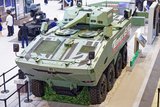FMS Patriot customers to receive technical engineering aid
CAS Inc is to provide missile defence technical engineering services for 14 FMS customers, under a $24.14 million contract modification from the Lower Tier Project Office (LTPO) in the US Army Program Executive Office Missiles and Space.
Work will be performed in Huntsville, Alabama with an estimated completion date of 28 February 2022, the DoD announced on 25 February.
The FMS customers are: Bahrain, Germany, Greece, Israel, Kuwait, Netherlands, Poland, Qatar, Romania, Saudi Arabia, South Korea, Spain, Sweden and the United Arab Emirates.
LTPO is responsible for centralised management of the Patriot missile defence system, including Patriot Advanced Capability-3 (PAC-3) interceptors and related components, ground support equipment and the Lower Tier Air and Missile Defense Sensor.
As part of our promise to deliver comprehensive coverage to our Defence Insight and Premium News subscribers, our curated defence news content provides the latest industry updates, contract awards and programme milestones.
More from Land Warfare
-
![World Defense Show 2026: ST Engineering’s Rhino 4x4 set to enter service]()
World Defense Show 2026: ST Engineering’s Rhino 4x4 set to enter service
The Rhino 4x4 protected vehicle is being manufactured for an undisclosed country, likely to be Singapore, while its Agil counter-UAS C2 system is in low-rate production.
-
![World Defense Show 2026: Saudi Arabia’s record defence spend highlights uncertain times]()
World Defense Show 2026: Saudi Arabia’s record defence spend highlights uncertain times
Saudi Arabia’s investment in its land forces, notably in the area of air defence as recently as 30 January, is a sign of the challenges the Gulf State faces, particularly the threat from Houthi rebels in Yemen.
-
![Singapore Airshow 2026: ST Engineering’s Terrex s5 highlights hybrid power’s role in future warfare]()
Singapore Airshow 2026: ST Engineering’s Terrex s5 highlights hybrid power’s role in future warfare
Hybrid-electric drive technology may address the growing energy demands of land warfare in future.
-
![CAVS rides a wave and prepares for surge requirements as orders roll in]()
CAVS rides a wave and prepares for surge requirements as orders roll in
The Common Armoured Vehicle System is continuing to rack up orders as the British Army looks likely to become an operator of the vehicle, while Italy and Ireland are also contenders.
-
![US DoD task force’s DroneHunter acquisition lays groundwork for Replicator 2 CUAS strategy]()
US DoD task force’s DroneHunter acquisition lays groundwork for Replicator 2 CUAS strategy
As the US Department of Defense looks to counter the growing threat of uncrewed aerial systems to improve homeland security, the DroneHunter acquisition could point to future commercial innovation.























